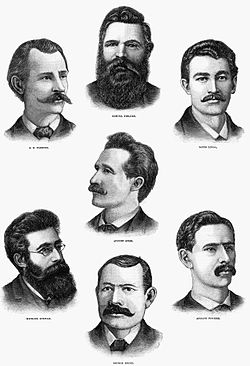Overview of and topical guide to anarchism
The following outline is provided as an overview of and topical guide to anarchism:
Contents
- Nature
- Schools of thought
- Classical
- Post-classical
- Contemporary
- Organizational forms
- History
- Timeline of major events
- History by region
- Historians
- Organizations
- Notable organizations
- Structures
- Literature
- Manifestos and expositions
- Notable figures
- Non-anarchists influential on anarchism
- Places named after anarchists
- Related philosophies
- See also
- Footnotes
- Further reading
- External links


